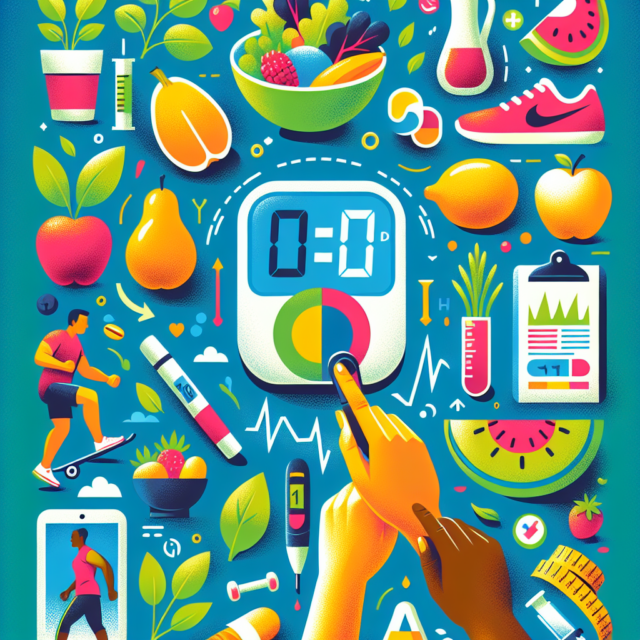Diabetes is more than just a diagnosis; it’s a condition that demands ongoing care and lifestyle adjustments. As healthcare professionals, we know that medications like metformin, insulin, and Jardiance play an essential role, but lifestyle changes are often the linchpin that holds a patient’s treatment plan together. Our patients don’t just need prescriptions—they need support in adopting and maintaining lifestyle habits that can dramatically impact their health outcomes.
But how do we, as medical professionals, guide them effectively? In this article, we’ll explore key lifestyle changes for diabetes that can not only optimize treatment but also improve quality of life for those living with this chronic condition.
Table of Contents
Understanding the Importance of Lifestyle Changes
Every medical professional working in diabetes care has likely encountered patients who struggle to make meaningful lifestyle changes. It’s not always about knowledge—it’s about behavioral transformation. These changes are as crucial as prescribing the right medications. Without a solid foundation of lifestyle management, medications alone won’t be enough. The analogy is simple: you can’t keep mopping the floor without turning off the leaking faucet. Lifestyle changes are the act of turning off that faucet.
Diet: The Foundation of Diabetes Management
When it comes to diabetes, diet is non-negotiable. Patients need guidance, not just in what they should eat, but also in how to structure their meals. Low-carb, Mediterranean, and DASH diets have all shown efficacy in helping manage blood sugar. More importantly, we must make these changes practical.
Portion Control and Carb Counting
Encouraging patients to take control of their plate can have an immediate effect. Educating patients on carbohydrate counting and portion control can empower them to make better choices. Even a reduction of 500 calories per day can lead to weight loss, improved insulin sensitivity, and better glycemic control.
Exercise: A Natural Blood Sugar Regulator
Exercise is like a magic pill for diabetes. Encouraging patients to incorporate even 30 minutes of moderate exercise most days of the week can significantly lower blood glucose levels. Whether it’s walking, swimming, or yoga, what matters is consistency. Aerobic exercise combined with strength training has the added benefit of improving insulin sensitivity and reducing A1C levels.
Stress Management: An Overlooked Aspect
Stress has a profound impact on blood sugar levels, yet it’s often overlooked. Elevated stress can trigger the release of hormones like cortisol, which increases blood glucose. As healthcare professionals, we must address this by helping patients develop stress management techniques—whether that’s through mindfulness, meditation, or therapy.
Sleep Quality and Diabetes
We cannot ignore the importance of sleep in managing diabetes. Poor sleep can disrupt insulin sensitivity, leading to higher blood glucose levels. Encourage patients to practice good sleep hygiene—consistent bedtime routines, reducing screen time, and avoiding caffeine late in the day can make a world of difference.
Alcohol and Smoking: Reducing Risks
Excessive alcohol and smoking both have detrimental effects on diabetes management. While moderate alcohol consumption may be acceptable for some, heavy drinking can cause dangerous spikes or drops in blood sugar. Smoking, on the other hand, increases the risk of diabetes-related complications like heart disease. Addressing these habits should be a part of every patient’s care plan.
Weight Management: Small Changes, Big Impact
Losing even 5-10% of body weight can improve insulin sensitivity and lower blood sugar. As healthcare providers, we must promote realistic and sustainable weight loss goals for our patients. A combination of dietary changes, regular exercise, and behavioral therapy often provides the best outcomes.
Behavioral Support: A Vital Tool in Adherence
Changing behavior is hard. For patients with diabetes, it can feel overwhelming. That’s where behavioral support comes into play. Whether it’s through counseling, diabetes education programs, or apps that track progress, giving patients tools for support makes a real difference in adherence to lifestyle changes.
The Role of Technology in Diabetes Management
We are living in a time where technology has transformed diabetes care. From continuous glucose monitors (CGMs) like the Dexcom G6 to smart insulin pens like the InPen, these innovations offer patients greater control and real-time data to manage their blood sugar. Encourage your patients to use these tools for better self-management.
Individualized Patient Education
No two diabetes patients are the same, and neither should their treatment plans be. Tailoring education to each patient’s unique lifestyle, challenges, and goals is crucial. What works for one may not work for another, so we need to meet patients where they are.
Collaborating with a Multidisciplinary Team
Finally, managing diabetes effectively often requires the involvement of a multidisciplinary team. Working closely with dietitians, endocrinologists, and diabetes educators can provide comprehensive care that addresses all aspects of a patient’s life.
Conclusion
As healthcare professionals, our role is not just to treat diabetes but to empower our patients to live better, healthier lives. While medications play an essential role, lifestyle changes are equally critical in managing diabetes and reducing complications. Small, consistent steps can lead to big, lasting impacts.
FAQs
1. How can lifestyle changes help manage diabetes?
Lifestyle changes such as diet modification, regular exercise, and stress management can improve insulin sensitivity and help control blood sugar.
2. What types of diets are recommended for diabetes?
Low-carb, Mediterranean, and DASH diets are often recommended. It’s important to tailor the diet to the patient’s needs.
3. How does exercise affect blood sugar levels?
Exercise lowers blood glucose levels by increasing insulin sensitivity and improving glucose uptake by the muscles.
4. Why is sleep important for diabetes management?
Poor sleep can affect insulin sensitivity, leading to higher blood sugar levels. Good sleep hygiene is essential for better glucose control.
5. Can behavioral therapy help patients stick to lifestyle changes?
Yes, behavioral therapy provides support and accountability, helping patients maintain long-term lifestyle changes.
For more resources, visit Diabetes in Control and for patient tools, you can explore American Diabetes Association.
Disclaimer: This content is not medical advice. For any health issues, always consult a healthcare professional. In an emergency, call 911 or your local emergency services.

